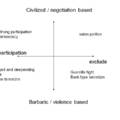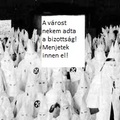Since early on the student movements I was able to claim the carrier ladder as a successful local coordinator, when we organised a self-help youth training group in Debrecen, and no long after while the network builder social workers involved us to teach brain storming skills as well other creative group work techniques. At the early age of 17 I was already a trainer of the "how to think together" - skill building and not only for student groups, back then I facilitate teacher groups as well or even helped with the strategy for the army youth organisation. During my university years I based on the high school local community experience I had to became a network builder and so my ex wife did, she was only 16 when she got involved with the TOT program, and after that she has been teaching the NGOs about the nonprofits marketing practice. Also I often worked with umbrella organisations as a sector-wide trainer. Let me introduce you to three case studies I conducted in the Hungarian countryside.
Village& NGOs
Back in 2003 right on the middle of the country at the bank of the Tisza River we organised a networking building model group called LEADER. As I remember 16 of the most affected by poverty villages were invited to participate in this study. At the beginning the group had to create a plan, and try to find economy development targets. At this point of the study politicians had no part on this process as it was under the control of NGOs and economy organisations. It was a stipulation that the General Manager therefore the decision maker of the study was a full time paid member of the NGO, as to manage this community building / donation process better and without external pressures.
However there were only volunteers NGOs in these areas. Except from the mosquito vaporizer non-profit organisation which had a full time driver paid member of staff. Back then the government closed all Family Help Centre’s support and all social worker colleagues were continuing normal activities voluntarily and without pay as any other Bureau Advices under the citizen’s control.
I noticed even before I started to work for the LEADER Umbrella organisation or the Telecottage network that there was no structure of citizens support or anyone working for NGO providing services within a regular Hungarian village although the EU granted a large amount of funds for development of these poor areas yet it was not possible to use these funds to fight against any kind of local issues therefore If we wanted to use the EU funds to help out countryside economy depression, we needed to strength all local NGOs.
Hungarian LEADER Association
In the most recent Hungarian history the LEADER had 3 time periods. Between 2004 & 2007 when we gained EU member experience, after that from 2007-2013 we were a regular EU member. But before all these from 1998 and 2004, there was a PHARE period, when Hungary was partly involved with the European Union and in this first period is when we tried the small LEADERs which were under the NGOs control as it was only logical for the community development experience that they would share that experience with the new entered networks. I was in a conference in Gödöllő, when the real LEADER started in Hungary. The chairman of the Hungarian LEADER Association sat beside me. As the speaker introduced the method, he said "in Hungary we had no experience about this kind of development program"; however it was clear that the government did not want to involve the first LEADER of the program or employ NGO leaders after that. Ironically not long after that person became a MP as member of the JOBBIK
To describe how futile this government aptitude was let me put this into an imaginary scenario, you are playing a virtual strategic game, and after a long time suffering from sunstroke and dehydration you find an oasis in the Sahara desert, but then not only you decide not to use it you actually poison the water and burn all the palms. What is the sense in that? I wonder.
Telecottage Association
This LEADER Association has 8-10 members. This case study is a bigger network. Around 80 local citizens services, and is partly available on the internet as there is now internet access in some of the local youth houses and community houses in Hungary. Although you probably need to travel to the next village to find this kind of NGO based service but if there any close these organisations are available as an institutional service. Mostly with one or two full time staff as in the Hungarian NGO sector, the nationwide networks have no budget to pay someone to pick up the phone in the office, neither the nationwide umbrella organisations working with voluntary staff.
Between 2007 and 2013, during the first whole EU financial period we spent 9 thousand million HUF through this channel. I thought Hungary needed every well built humanitarian service, especially in the economically depressed areas. But I was wrong! Both umbrella organisations were dismantled around 2008 - 2009.
Jobcreation.hu Program
As a community development social worker I worked with them. Our last project was the "JobCreation.hu Program". A web based search engine was created for this network, which was scheduled to be financed by EU programs. There were 55 service networks in 9 categories. In one hand we focus on one group, which serviced targeting unemployed people, business and NGO organisations, or networks. And on the other, to structure and direct the service itself, as to how to assign money, choosing the right information packages, or approach shaping/advisor activities.
This register was supposed to help social workers to find the relevant service quickly and effectively. It was even possible to inform any internet assistant online as to any change within the social system, which services/help were or not available on a monthly bases. This system also allowed the good monitoring of everyone’s expenditure and it was easy to follow what we were doing with the EU development fund.
But at the end all these three case studies as well as their organisations and networks have to be dissolved due to a lack of funds. It seems like we, Hungarians love to go back to the zero point and start to build up everything from scratch. And even more worrying is the fact that not only where these local bodies or umbrella organisations are dying there are no NGO services expanding accordantly to cover the needs of the community as a result of the current two main political parties, the FIDESZ and the MSZP made a quiet civil war against the NGO sector as well as against the framework of the citizen participation! But that will be a new story in a new article!





Kommentek